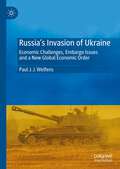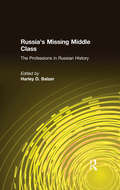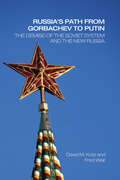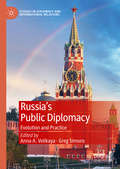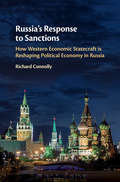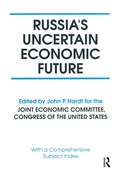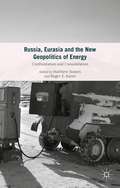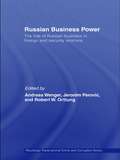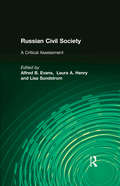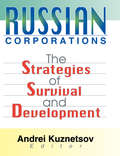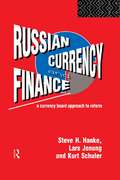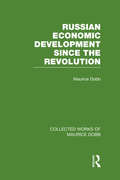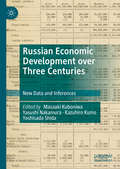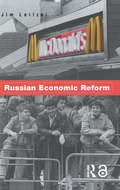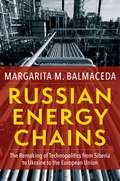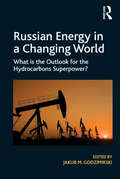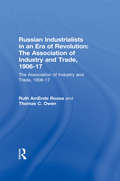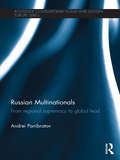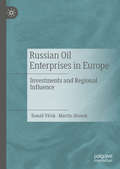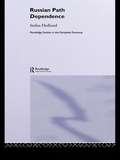- Table View
- List View
Russia's Invasion of Ukraine: Economic Challenges, Embargo Issues and a New Global Economic Order
by Paul J. WelfensThis book presents a cutting-edge analysis of the economic effects and challenges of Russia’s invasion of Ukraine, with a special focus on EU sanctions on Russian energy and Ukraine’s political relationship with the European Union in a global context. Welfens outlines key macroeconomic perspectives on the ongoing conflict between Russia and Ukraine, highlighting in particular how sanctions posed by the international community will have a wider economic impact than what has so far been envisaged. The book discusses the effects of Russian gas supply boycotts against Western countries as well as global effects of an EU energy import boycott on Russia, especially for China and the Asian continent. An innovative proposal to cut electricity prices is presented. It also explores the challenges to relations between the EU, China and Russia caused by the invasion, the effects of the unfolding refugee crisis (within a post-Brexit EU), military and humanitarian aid pledges to Ukraine, and the risks of reduced multilateralism within the world economy as a direct result of the war. The book also analyses the risks and benefits of potential enlargement of the EU to integrate Ukraine as a member state. The topics covered by the book are all set within a long-run view of diplomatic and economic relations between the West, Russia and Ukraine. The factors analysed here provide a new, broader picture of the international effects of the conflict, as well as its potential implications for policy design as we enter a new global order marked by the Russo-Ukrainian war. The book will be of interest to researchers and policy-makers working in international economics, new political economy, European politics and integration, and macroeconomics more broadly.
Russia's Missing Middle Class: The Professions in Russian History
by Harley D. BalzerThis work describes the emergence of the professions in late tsarist Russia and their struggle for autonomy from the aristocratic state. It also examines the ways in which the Russian professions both resembled and differed from their Western counterparts.
Russia's Path from Gorbachev to Putin: The Demise of the Soviet System and the New Russia
by David Kotz Fred WeirOver the past few years, many of the former Communist-rule countries of Central and Eastern Europe have taken a steady path toward becoming more or less normal capitalist countries - with Poland and Hungary cases in point. Russia, on the other hand, has experienced extreme difficulties in its attempted transition to capitalism and democracy. The pursuit of Western-endorsed policies of privatization, liberalization and fiscal austerity have brought Russia growing crime and corruption, a distorted economy and a trend toward authoritarian government. In their 1996 book - Revolution from Above - David Kotz and Fred Weir shed light on the underlying reasons for the 1991 demise of the Soviet Union and the severe economic and political problems of the immediate post-Soviet period in Russia. In this new book, the authors bring the story up-to-date, showing how continuing misguided policies have entrenched a group of super-rich oligarchs, in alliance with an all-powerful presidency, while further undermining Russia's economic potential. New topics include the origins of the oligarchs, the deep penetration of crime and corruption in Russian society, the financial crisis that almost destroyed the regime, the mixed blessing of an oil-dependent economy, the atrophy of democracy in the Yeltsin years, and the recentralization of political power in the Kremlin under President Putin.
Russia's Public Diplomacy: Evolution and Practice (Studies in Diplomacy and International Relations)
by Greg Simons Anna A. VelikayaRussian public diplomacy attracts growing attention in the current global climate of tension and competition. However, it is often not understood or is misunderstood. Although some articles and book chapters exist, there are almost no books on Russian public diplomacy neither in Russian, nor in English. This edited collection is an in-depth and broad analysis of Russian public diplomacy in its conceptual understanding and its pragmatic aims and practice. Various aspects of Russian public diplomacy – from cultural to business practices – will interest professors, students and practitioners from various countries. Written by a diverse collection of the most prominent and capable scholars, from academia to international organizations, with a wealth of knowledge and objective experience, this book covers the vital topics and thoroughly analyzes the best practices and mistakes within the broad understanding of public diplomacy conducted by the Russian Federation.
Russia's Response to Sanctions: How Western Economic Statecraft is Reshaping Political Economy in Russia
by Richard ConnollyIn the first in-depth analysis of the effects of sanctions on the Russian political economy, Richard Connolly details the Western sanctions targeting the energy, defense and financial sectors, and the Russian response. He explores how the Western sanctions have caused Russian officials to formulate rapid policy responses to enable the country to adapt to the new circumstances. The sanctions and the Russian response have caused the state's role in the Russian economy to grow stronger and caused its policymakers to accelerate efforts to shift Russia's foreign economic relations away from the West and toward Asia. Connolly analyzes how the political economy in Russia and the nature of the country's integration with the global economy have been fundamentally reshaped. He demonstrates that a new system of political economy is emerging in Russia, and how it is crucial to understanding Russia's future trajectory.
Russia's Uncertain Economic Future
by John P. Hardt Robert F. BennettThe contributors to this volume analyze the present state of the Russian economy and its future prospects - which now seem brighter than at any previous time in the country's history. The Russian economy is now showing positive GDP growth and a positive balance of payments, portending a trend of sustained growth. The record of the Putin presidency with respect to the establishment of market-friendly legal and administrative environments is substantially positive. On the other side of the ledger, the contributors identify the persistence of monopolies in energy, transportation, and agriculture; distortions resulting from corruption, infrastructural inadequacies, and the maldistribution of political power and decision-making authority; demographic decline and the erosion of human capital as manifested in the health, education, and welfare of the population. Russia's successful development as a democratic society with a market economy is of great importance to its neighbors and to the global economy, and specifically to the United States, which is why the U.S. Congress commissioned these studies by expert analysts. This edition includes a comprehensive subject index, making the volume user-friendly.
Russia, Eurasia and the New Geopolitics of Energy: Confrontation and Consolidation
by Matthew Sussex Roger E. KanetRussia, Eurasia and the New Geopolitics of Energy.
Russia: A Drama in Three Acts
by Rawi Abdelal Rafael Di Tella Sogomon Tarontsi Galit GoldsteinThe collapse of central authority in the Soviet Union in 1991 ushered in a period of revolutionary transformations for the states that emerged in its wake. The leaders of Russia, the USSR's successor, struggled to reestablish central authority while also seeking to avoid further disintegration, establish a democratic polity, and institute a market economy across the next several years. Russia would navigate further economic crisis and a swiftly evolving geopolitical order as it returned to the world stage. The case examines the different governance approaches adopted by Presidents Boris Yeltsin, Dmitry Medvedev and Vladimir Putin, and concludes with a discussion of Russia's strategic challenges and opportunities in 2019. The case focuses on problems of state authority; fiscal capacity; institutionalization of political parties; relations between the federal center and provincial governments; relations between the state and big business; economic policy; international relations; and models of economic development.
Russia: Revolution and Reform
by Rawi Abdelal Sogomon TarontsiThe collapse of central authority in the Soviet Union in 1991 ushered in a period of revolutionary transformations for the states that emerged in its wake. The leaders of Russia, the USSR's successor, since then have struggled to reestablish central authority while also seeking to avoid further disintegration, establish a democratic polity, and institute a market economy. The case contrasts different approaches adopted by Presidents Boris Yeltsin and Vladimir Putin and concludes with a vision outlined by Russia's third post-Soviet president, Dmitry Medvedev. The case focuses on problems of state authority; fiscal capacity; institutionalization of political parties; relations between the federal center and provincial governments; relations between the state and big business; economic policy; and models of economic development.
Russia: The End of a Time of Troubles?
by Rawi AbdelalDescribes Russia's troubled economic transition since 1991, highlights the problem of institutional development, and surveys the challenges President Vladimir Putin faced in 2000. The first section provides a brief synopsis of liberalization, stabilization, and privatization under President Boris Yeltsin. The second section describes the economic difficulties Russia experienced during the 1990s involving demonetization, federalism, taxes, contract enforcement, the legal system, the 1998 financial crisis, and public health. Concludes with President Putin's political and economic plans.
Russian Business Power: The Role of Russian Business in Foreign and Security Relations (Routledge Transnational Crime and Corruption)
by Andreas Wenger Jeronim Perović Robert W. OrttungSince the collapse of the Soviet Union, Russia has developed a powerful business community and a potent network of transnational organized groups. Russian Business Power explores the powerful impact these new actors are having on the evolution of the Russian state and its foreign behaviour. Unlike other books, which focus either on Russia's foreign and security policy, or on the evolution of Russian business, legal and illegal, within the context of Russia's domestic transition, this book considers how far Russia's foreign and security policy is shaped by business. It considers a wide range of issues, including energy, the arms trade, international drug flows, and human trafficking, and examines the impact of Russian business in Russia's dealings with Western and Eastern Europe, the Caspian, the Caucasus and the Far East.
Russian Civil Society: A Critical Assessment
by Alfred B. Evans Laura A. Henry Lisa SundstromA vibrant civil society - characterized by the independently organized activity of people as citizens, undirected by state authority - is an essential support for the development of freedom, democracy, and prosperity. Thus it has been one important indicator of the success of post-communist transitions. This volume undertakes a systematic analysis of the development of civil society in post-Soviet Russia. An introduction and two historical chapters provide background, followed by chapters that analyze the Russian context and consider the roles of the media, business, organized crime, the church, the village, and the Putin administration in shaping the terrain of public life. Eight case studies then illustrate the range and depth of actual citizen organizations in various national and local community settings, and a concluding chapter weighs the findings and distills comparisons and conclusions.
Russian Corporations: The Strategies of Survival and Development
by Andrei KuznetsovDo you understand what it takes to conduct business successfully in the new Russia?The large-scale market reforms that revolutionized Russian business are now nearly a decade old. In this period, as editor Andrei Kuznetsov puts it, ”The Russian economy has acquired some intriguing characteristics that affect any firm or person wishing to do business in Russia. Most noticeable of them are the spread of barter transactions, a low level of investment activities, labor hoarding, and the importance of networks and unorthodox forms of corporate governance.” Russian Corporations: The Strategies of Survival and Development shows that while predictions of the quick development of a functional market economy in the new Russia have not, for the most part, come true, it is nevertheless possible, if one’s preconceptions are properly modified, to do business successfully there.In this timely and informative book you will find: information about the scale and scope of barter in the new Russia--how it works and why it is crucial to the survival of industry the pros and cons of insider shareholding in the new Russia the evolution of ownership structures and patterns of control in Russian firms a discussion of investment (and the lack of it) in Russian industry data about supplier/buyer relationship management in the regionInvestors, businesspeople, educators, and students will all find fascinating information in Russian Corporations: The Strategies of Survival and Development. This single source will bring you up to date on the theory and practice of corporate business in the new Russia.
Russian Currency and Finance: A Currency Board Approach to Reform
by Lars Jonung Steve H. Hanke Kurt SchulerAs the new Russian state struggles with the transition to a market economy, the need for radical monetary reform becomes increasingly urgent. The choice of reform is crucial, for it will largely determine Russia's future economic performance. In order to break free of the lingering effects of Soviet central planning, the new Russian state needs a stable, convertible currency. Steve H. Hanke, Lars Jonung and Kurt Schuler propose that Russia establishes a currency board which would issue a Russian currency fully convertible with international currency, backed 100 per cent by international bonds. The international community would aid in establishing the currency board by providing the initial reserves. Early supplies of this new Russian currency would be distributed free to Russian citizens. The authors give detailed explanations of how the currency board could be established and how it would work.
Russian Economic Development Since the Revolution (Business Enterprises Reprint Ser.)
by Maurice DobbThe story of the economic development of the Soviet Union provided the first case in history of the establishment of a socialist economy and was therefore of great interest for economists and economic historians of the twentieth century. At the same time it affords a unique example of the transformation of a country into an industrial nation at an unprecedented pace and under the guidance of a national economic plan. This book examines these changes from the Russian Revolution of 1917 to 1927.
Russian Economic Development over Three Centuries: New Data and Inferences
by Kazuhiro Kumo Yasushi Nakamura Masaaki Kuboniwa Yoshisada ShidaThis book aims to provide a comprehensive statistical picture of the Russian economic development covering the Imperial, Soviet, and New Russian periods. The authors have reconstructed Russian socio-economic statistics from both published and archival materials. The book gives concise descriptions as well as new insights on the Russian economic development. Compiled such that estimations by the authors are kept to a minimum and extensive explanations and notes on the sources, the definitions, the statistical methodologies, the problems and inconsistencies of the original data, and the pitfalls of interpreting the time series are given makes this a standard reference book of the Russian economic history. It will be of value to economists, scholars of collectivist economics, and scholars of Russia and the Soviet experience.
Russian Economic Reform
by James LeitzelTransitions from socialism to capitalism are complex, both in theory and practice. Russian Economic Reform enables the reader to come to a much better understanding of these momentous changes, by providing a clear and accessible account of the major features of transition. It argues that attempts to portray the reform process is a disaster are misconceived, because they fail to take account of just how badly the pre-reform economy was doing. Many of the problems that are emerging now have their antecedents in the earlier economic system.
Russian Energy Chains: The Remaking of Technopolitics from Siberia to Ukraine to the European Union (Woodrow Wilson Center Series)
by Margarita M. BalmacedaRussia’s use of its vast energy resources for leverage against post-Soviet states such as Ukraine is widely recognized as a threat. Yet we cannot understand this danger without also understanding the opportunity that Russian energy represents. From corruption-related profits to transportation-fee income to subsidized prices, many within these states have benefited by participating in Russian energy exports. To understand Russian energy power in the region, it is necessary to look at the entire value chain—including production, processing, transportation, and marketing—and at the full spectrum of domestic and external actors involved, from Gazprom to regional oligarchs to European Union regulators.This book follows Russia’s three largest fossil-fuel exports—natural gas, oil, and coal—from production in Siberia through transportation via Ukraine to final use in Germany in order to understand the tension between energy as threat and as opportunity. Margarita M. Balmaceda reveals how this dynamic has been a key driver of political development in post-Soviet states in the period between independence in 1991 and Russia’s annexation of Crimea in 2014. She analyzes how the physical characteristics of different types of energy, by shaping how they can be transported, distributed, and even stolen, affect how each is used—not only technically but also politically. Both a geopolitical travelogue of the journey of three fossil fuels across continents and an incisive analysis of technology’s role in fossil-fuel politics and economics, this book offers new ways of thinking about energy in Eurasia and beyond.
Russian Energy in a Changing World: What is the Outlook for the Hydrocarbons Superpower?
by Jakub M. GodzimirskiFor a long time Russia’s position as a key global energy player has enhanced Moscow’s international economic and political influence whilst causing concern amongst other states fearful of becoming too dependent on Russia as an energy supplier. The Global Financial Crisis shook this established image of Russia as an indispensable energy superpower, immune to negative external influences and revealed the full extent of Russia’s dependence on oil and gas for economic and political influence. This led to calls from within the country for a new approach where energy resources were no longer regarded wholly as an asset, but also a potential curse resulting in an over reliance on one sector thwarting modernization of the economy and the country as a whole. In this fascinating and timely volume leading Russian and Western scholars examine various aspects of Russian energy policy and the opportunities and constraints that influence the choices made by the country’s energy decision makers. Contributors focus on Russia’s energy relations with the rest of the world alongside internal debates about the need for diversification and modernisation in a changing economy, country and world system where overdependence on energy commodities has become a key concern for customer and supplier alike.
Russian Industrialists in an Era of Revolution: The Association of Industry and Trade, 1906-17
by Thomas C. Owen Ruth AmEnde RoosaRuth Roosa's long-awaited study focuses on the most important business organization in imperial Russia. the Association of Industry and Trade, the nerve center of Russian capitalism in the years between the revolutions of 1905 and 1917. The author's comprehensive, nuanced analysis of the Association's policy positions on Russian economic development has no peer. Of particular interest are the insights the study affords into the peculiarities of Russian business -- including the operation of semi-monopolistic syndicates and the role of imported capital, banks, and the autocratic state. It supplies historical perspective on some of the more perplexing features of the new Russian capitalism.Roosa was a pioneer in the study of early twentieth-century Russian capitalism. This volume, prepared for posthumous publication by her friends and colleagues, makes her work available at a time when it has new resonance and relevance.
Russian Military Intelligence in the War with Japan, 1904-05: Secret Operations on Land and at Sea (Routledge Studies in the History of Russia and Eastern Europe #Vol. 7)
by Evgeny SergeevExamining Russian military intelligence in the war with Japan of 1904-05, this book, based on newly-accessible documents from the tsarist era military, naval and diplomatic archives, gives an overview of the origins, structure and performance of Russian military intelligence in the Far East at the turn of the twentieth century, investigating developments in strategic and tactical military espionage, as well as combat renaissance. It provides a comprehensive reappraisal of the role of military intelligence in the years immediately preceding the First World War, by comparing the Russian military secret services to those of the other great powers, including Britain, Germany, France and Japan.
Russian Multinationals: From Regional Supremacy to Global Lead (Routledge Contemporary Russia and Eastern Europe Series)
by Andrei PanibratovRussian multinationals are playing an increasingly important role in the world economy, particularly in some key sectors such as oil, gas and metallurgy. At the same time, Russian multinationals differ in many respects from multinationals from other countries in that they often receive special treatment from the Russian government, and, because of past experiences, international investors are often reluctant to invest in them. This book presents a comprehensive overview of Russian multinationals. It discusses the rise of Russian multinationals, examines Russian multinationals' activities in key sectors, analyses the relationship between Russian multinationals and the Russian government and between Russian multinationals and international investors, and concludes by assessing how Russian multinationals are likely to develop in future.
Russian Oil Enterprises in Europe: Investments and Regional Influence
by Tomáš Vlček Martin JirušekThis book analyzes motivation, investments, and influence of the Russian Federation and Russian companies in the European oil sector, specifically, the Southeastern Europe. The main idea of the book is to highlight economic and political logic of the Russian activities in the oil sector as well as to provide a brief analysis of the situation in the natural gas sector. The findings help to understand the general code of conduct of Russian energy companies and their potential ties to their homeland government. This project will appeal to academics, researchers, graduate students, field professionals, and everyone who is interested in Russian and European geopolitics.
Russian Path Dependence: A People with a Troubled History (Routledge Studies in the European Economy #Vol. 15)
by Stefan HedlundRussia's transition to a market economy has been tortuous to say the least. However, this book argues that the arguments and counter-arguments that pitch shock therapy against gradualism are wide of the mark and quite pointless.Indeed, the reasons for the warped outcomes can actually be traced back through the long sweep of Russian history. Decisions made in the distant past can fully influence policy- making in the present. Hedlund's thesis can, like this, be seen as influenced by the 'path dependency' theories of Paul David among others.
